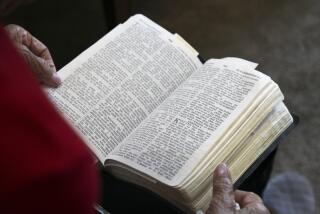‘The Book’ Popular but It’s Not the Bible, Scholar Says
- Share via
The problem, according to noted Bible scholar Eldon J. Epp, is that millions of readers who read “The Book”--a popular paraphrase of the Bible--”will think that this is what the Bible actually says.”
Epp, who is Harkness Professor of Biblical Literature and chairman of the Department of Religion at Case Western Reserve University in Cleveland, took a long look at “The Book,” as Tyndale Publishing calls its latest version of the “Living Bible.”
Writing in Bible Review magazine, Epp said he did not like what he found, calling the “The Book” a prejudicial paraphrase of the Bible that “not only Christianizes the Old Testament but incorporates into both Testaments a fundamentalist interpretation that goes far beyond what the biblical text actually says.”
Epp also found that “The Book” is blatantly anti-Jewish in a way that borders on anti-Semitism.
‘Tongue-Lashing’ Jews
“ ‘The Book’ appears almost to derive pleasure from castigating and chastening the Jews and Judaism--as if to punish them by tongue-lashing and to reprimand them for failing to accept ‘their Messiah,”’ Epp said.
He said the paraphrasing “fosters a misunderstanding of the Judaism of Jesus’ day . . . by reducing Judaism to a mere legalism.”
Tyndale editors, however, defended their version.
“There are two basic views on Bible translations and both are legitimate,” said Phil Comfort of Tyndale. “One, that Epp represents, says that a literal translation is the most accurate. Other scholars, and there are many of them, feel that the best translation is thought-for-thought translation. Dr. (Kenneth) Taylor (who produced ‘The Living Bible’) has maintained that it is a legitimate thought-for-thought paraphrase.”
In his critique, Epp notes that “The Book” translates the Greek term genea, or generation as nation. Thus, in Matthew, Jesus is made to refer to Israel as “an evil faithless nation” and “this evil, unbelieving nation” whereas, according to Epp, the correct translation would refer to his contemporary generation.
Has Jesus Blaming Jews
Epp also found that “The Book” depicts Jesus blaming the Jewish leaders for his betrayal to the Romans rather than blaming Judas. Where the Revised Standard Version of the Bible translates John 19:11 as, “Therefore he (Judas) who delivered me to you (Pilate) has the greater sin,” “The Book” translates “he” as “those” and indicates that “those” refers to “Jewish leaders.”
The scholar also found that “The Book” uses much current evangelical and fundamentalist phraseology--notably such terms as “saved” and “born again” in the biblical texts “where there is no textual or contextual warrant for them.”
In several passages, he noted, “The Book” uses the word “saved” where a more accurate translation is “justified.”
And he said that in a number of passages in Romans--3:31, 4:2, 4:5, 4:11-12--the references to “being saved” are interjected where they do not exist at all.
Sometimes, Epp said, “The Book” simply changes the meaning of a passage to make it consistent with evangelical or fundamentalist belief.
End of the World
Thus Mark 13:30, in which Jesus seems to be saying that the end of days will come very soon, is translated in the Revised Standard Version as, “Truly, I say to you, this generation will not pass away before all these things take place.”
More to Read
Sign up for Essential California
The most important California stories and recommendations in your inbox every morning.
You may occasionally receive promotional content from the Los Angeles Times.












